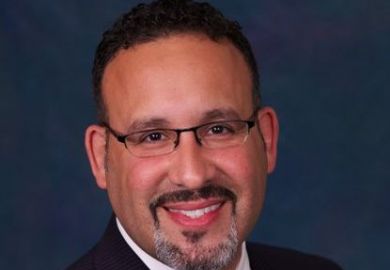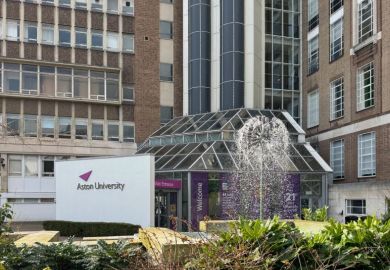Reversing the “tragic message” to international students “that America’s colleges were closed for business” and restoring public trust in universities are major priorities for US higher education in the post-Trump era, according to two of its most senior leaders.
Lynn Pasquerella, president of the Association of American Colleges and Universities, and Ted Mitchell, president of the American Council on Education, spoke in a session on “Reimagining American higher education” at Times Higher Education’s THE Live US event, held online.
Dr Pasquerella, a former president of Mount Holyoke College, said that both the pandemic and former president Donald Trump’s travel bans had been factors in a big drop in international enrolments at US colleges this autumn, calling for the Biden administration to act to remedy some of the damage by speeding up visa processing.
Dr Mitchell, a former undersecretary in the US Department of Education responsible for all post-secondary and adult education policy and programmes, and a former president of Occidental College, said “everyone in higher education has to be concerned” about the picture on international enrolments.
“The notion that American colleges and universities were closed for business was a tragic message to send to our colleagues and citizens around the world,” he added. “We’re hoping the current administration looks to change that.”
There were huge cultural diversity benefits brought by foreign students, plus, “as is true for international institutions across the world, we all depend on the free flow of students’ tuition dollars and international exchanges…to make sure that the engine of higher education across the world is churning well”, Dr Mitchell said.
But he was “encouraged” by Biden administration appointments to the Department of State and the Department of Education, hoping for “a new era of openness”.
Dr Pasquerella also highlighted a “seven-year decline in public trust in the promise of higher education in America” shown by some surveys, a decline she said was particularly acute among 18- to 25-year-olds, along with Mr Trump’s infamous “I love the poorly educated” comment.
ACE has carried out focus groups aiming “at that group President Trump was talking about”, Dr Mitchell said.
He added: “The national rhetoric in the US seems to be something like: ‘You don’t need to go to college; if you do go to college, you’re going to be saddled with enormous amounts of debt, you’ll have a degree that doesn’t matter in the marketplace, and you’ll end up spending the next 25 years in your parents’ basement.’”
US colleges and universities, Dr Mitchell continued, “need to remind Americans of the value of higher education, need to remind Americans that the unemployment rate for those with college degrees is half that for people without degrees…and we need to remind state legislators and others in the public policy world that an educated democracy is one that makes good decisions, not only out of self-interest but out of collective interest”.
Among potential ways forward on policy, Dr Mitchell hoped for federal and state policies to create “lifetime education accounts” in the wake of the pandemic, and for Pell Grants for disadvantaged students to be made available to adults throughout their lives and for short courses.
Dr Pasquerella hoped to see the Biden administration focus on “access and affordability” in higher education, bringing a “return to our historic missions of educating for democracy”.
Dr Mitchell said: “We have lost the sense of higher education as a public good as well as a private good.” Colleges and universities should “look for ways to measure and celebrate the contribution higher education makes to the public good”, he added.
Register to continue
Why register?
- Registration is free and only takes a moment
- Once registered, you can read 3 articles a month
- Sign up for our newsletter
Subscribe
Or subscribe for unlimited access to:
- Unlimited access to news, views, insights & reviews
- Digital editions
- Digital access to THE’s university and college rankings analysis
Already registered or a current subscriber?








